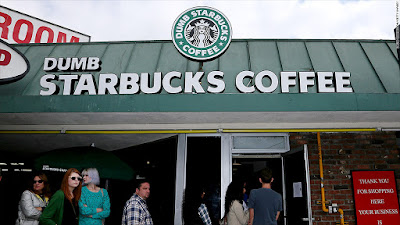Imitation, Patents and "Dumb Starbucks"
Although many think that a firm's patents do well to prevent imitation, there was one instance in which the opposite was the case for Starbucks.
In 2014, a popular TV show titled "Nathan for You" experimented with the imitation laws surrounding one of the world's most recognizable companies. Parody imitations are a loophole, so he created "dumb Starbucks" as a way to show an ailing coffee company how they could boost their sales. Because every single item in store, on the menu, and surrounding thebuilding had the word "dumb" before it, it was considered a parody. It didn't take long after opening for Nathan to attract attention from all over the world.
Starbucks quickly shut the entire project down, but it was a prime example of how simple it was for one man to open a store that completely imitated what Starbucks was doing. And if the coffee was just as good, why would anyone choose to go to Starbucks? At least they were getting a new experience out of the parody shop. It goes to show, however, how easy it truly is to imitate a firm's way of business. If they had simply named the coffee shop differently and picked a different color scheme, it may have gone unnoticed. As noted in the textbook, "patents may not be immune to low-cost imitation, [but] the skills and abilities that enable a firm to develop numerous products or services over time can be a source of sustained competitive advantage even though any one of these products or serviced may be imitated."
 |
| Source: KTLA |
Starbucks quickly shut the entire project down, but it was a prime example of how simple it was for one man to open a store that completely imitated what Starbucks was doing. And if the coffee was just as good, why would anyone choose to go to Starbucks? At least they were getting a new experience out of the parody shop. It goes to show, however, how easy it truly is to imitate a firm's way of business. If they had simply named the coffee shop differently and picked a different color scheme, it may have gone unnoticed. As noted in the textbook, "patents may not be immune to low-cost imitation, [but] the skills and abilities that enable a firm to develop numerous products or services over time can be a source of sustained competitive advantage even though any one of these products or serviced may be imitated."
Comments
Post a Comment